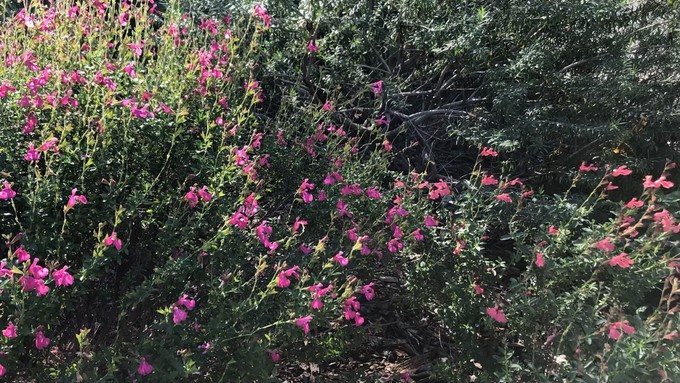
Find great deals on water-wise shrubs, perennials and trees including Arboretum All-Stars

Fans of salvias can find many varieties of the perennial shrub at the UC Davis Teaching Nursery clearance sale this weekend. The ones shown here grow just outside the nursery. Kathy Morrison
Early November offers prime planting conditions, particularly for water-wise shrubs, perennials and trees. California natives also appreciate a head start with fall planting. The relatively warm weather and soil prompts deep roots and a chance to become established before the challenges of hot weather next summer.
Where to find great deals and a huge selection of the right plants to put in the ground now? The UC Davis Arboretum’s Teaching Nursery, of course.
On Saturday, Nov. 4, the nursery hosts its annual fall clearance sale. Open to the public from 9 a.m. to 1 p.m., this sale is the last chance to tap into the nursery’s vast inventory this year. Admission is free.
“It’s the last sale of the season and, while many plants will be sold out, there will still be a great selection of attractive, low-water plants perfect for our region, all at clearance sale prices,” says the nursery’s staff. “Everything will be marked down 20 percent. … There will also be a deep discount bench for extra savings!”
Members of Friends of the UC Davis Arboretum save an additional 10% off their purchases. Not a Friend? Join at the gate and get a gift, too.
“Most of these plants we offer at these sales are grown on site, including the Arboretum All-Stars – our top recommended plants for Central Valley gardens,” say the sale organizers. “Our nursery staff, in addition to dozens of students and volunteers, propagate and grow the majority of plants we sell.
“By shopping these sales, you support the UC Davis Arboretum and Public Garden’s environmental leadership programs, the growth of our gardens and collections and the wide variety of free, educational events we offer the public.”
Thousands of plants are still available. Browse the assortment online before you go: https://arboretum.ucdavis.edu/plant-sales.
Need ideas? The nursery features several large demonstration beds spotlighting the Arboretum All-Stars and other staff favorites.
The Arboretum Teaching Nursery is located on Garrod Drive near the small animal veterinary hospital on the UC Davis campus.
For details and directions: https://arboretum.ucdavis.edu/.
Comments
0 comments have been posted.Sacramento Digs Gardening to your inbox.
Sites We Like
Garden Checklist for week of July 21
Your garden needs you!
* Keep your vegetable garden watered, mulched and weeded. Water before 8 a.m. to reduce the chance of fungal infection and to conserve moisture.
* Feed vegetable plants bone meal, rock phosphate or other fertilizers high in phosphate to stimulate more blooms and fruiting. (But wait until daily high temperatures drop out of the 100s.)
* Don’t let tomatoes wilt or dry out completely. Give tomatoes a deep watering two to three times a week.
* Harvest vegetables promptly to encourage plants to produce more. Squash especially tends to grow rapidly in hot weather. Keep an eye on zucchini.
* Pinch back chrysanthemums for bushy plants and more flowers in September.
* Remove spent flowers from roses, daylilies and other bloomers as they finish flowering.
* Pinch off blooms from basil so the plant will grow more leaves.
* Cut back lavender after flowering to promote a second bloom.
* It's not too late to add a splash of color. Plant petunias, snapdragons, zinnias and marigolds.
* From seed, plant corn, pumpkins, radishes, winter squash and sunflowers.